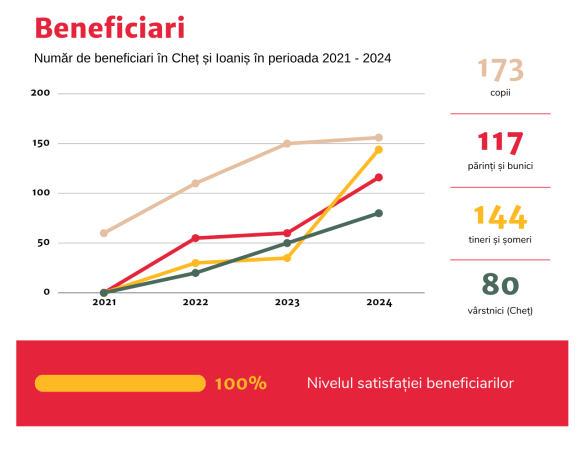Rezultatele proiectului

Rezultatele proiectului
The results obtained from the implementation of the project PN402 - Local Development for Disadvantaged Communities in Bihor County (Communities United in Bihor) bring us many satisfactions.
The Municipality of Marghita and NGOs work together for the development of vulnerable communities
In addition to the innovative public-private partnership between the Municipality of Marghita and the 3 NGOs - Kécenlét Association, Caritas Eparhial Oradea Association and Skyhøyt Live Scene from Norway, without which we would not have been able to implement the project effectively, we created links between two communities - Cheț village and Finiș commune in Bihor.
Integrated social services for vulnerable communities
We developed integrated social services for 564 members of the two vulnerable rural communities: 85 children from Chet and 88 from Finis now benefit from afterschool services, while 56 parents or grandparents from Chet and 61 from Finis have access to parenting education services. In addition, some 50 people in Chet and 94 in Finis, including young people under 25, young people not in education or training, unemployed and inactive people, have been integrated into employment programmes. In addition, social services are provided in Chet for 80 elderly people (day centre, home care and meals on wheels). All 564 project participants benefit from quality socio-medical services.
The project has also carried out repair works to the building of the St. Martin's Afterschool Centre in Ioanis, transforming all the spaces of the building into places adapted to the needs of the beneficiaries.
We provide additional help in overcoming the vulnerability of the beneficiaries of services in Cheț through clothes cleaning services, for which we purchased a washing/drying machine. And in order to strengthen the local identity, The Cheț Village Monograph and the Cheț Local Recipe Book represent our efforts to preserve and promote the cultural heritage and local traditions of Cheț village, bringing together community members in a common effort to celebrate our identity and history.
Increased satisfaction among beneficiaries
With the completion of the project, project beneficiaries from the communities of Chet and Finis expressed an increased level of satisfaction with the integrated services provided. This demonstrates the positive impact of the project on people's lives and the team's commitment to ensuring sustainable and inclusive development in Bihor County. The PN402 project is an outstanding example of collaboration between local authorities, NGOs and international partners, highlighting that through joint efforts significant change can be brought about in vulnerable communities.
Training and exchange of experience
Project teams were trained in the restorative approach and developed key social skills, while benefiting from the transfer of best practices from Norwegian experts. Four exchanges of experience between Romanian partners and two in Norway contributed to enriching knowledge and improving practices applied in disadvantaged communities.
Restorative practices, proven to be an effective model in these socio-economically disadvantaged communities, underpin the two resource centres in Chet and Ioanis. A strengthened network has been developed through face-to-face meetings and the successful organisation of two international conferences on restorative practices, attended by experts from Romania, Hungary and Belgium.
An innovative approach to community development - Restorative practices
Training in restorative practices has been a significant step in the evolution of our teams and in transforming our approach to relationships and conflict resolution, from management to beneficiary relations. It is true that the process has not always been easy, but we have learned that patience and dedication of sufficient time are essential to achieving lasting and meaningful results in our community.
The successful organisation of two international conferences in restorative practice is a milestone in our journey and a testament to our commitment to promoting and implementing this approach in our community and beyond. We were pleased to have a large turnout at the conferences, which demonstrates an increased interest in restorative practices and their potential impact in our communities. The positive feedback we received from participants confirmed the importance and relevance of the topic, and the acute need to make changes at the community level, both at the micro level, in contexts such as school classrooms, and at the macro level, at the local and community level.
The Good Practice Guide is a valuable source of information and resources for all those interested in adopting this approach to managing conflict and improving relationships in various community contexts is available to all interested parties and can be downloaded here. We encourage you to explore the content and contribute your own experiences and knowledge of the restorative approach. We invite you to contact us and collaborate to promote and implement this valuable approach where we each do our work.
Project in photos: click here.